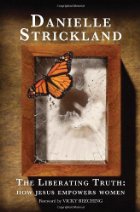No Matter the Cost, by Vance Brown (with John Blase) is a book written for men—more specifically, for those in the “Men’s Movement.”
Vance Brown is Chairman and CEO of Band of Brothers ministry. The book is intended to be a rallying cry for men who are discouraged. He calls men to be one of those referred to in John’s Revelation who “defeated [the accuser] through the blood of the Lamb…. They were willing to die for Christ.”
Brown challenges men: “Will you be one of the saints used by God to finally defeat evil?”
The largest part of this book is a blow-by-blow, phrase-by-phrase discussion of the Lord’s Prayer, sometimes called the Model Prayer. It is illustrated throughout by “brother’s stories”. These are definitely war stories, stories of men on the front lines, dealing with evil in their own lives and with death and suffering.
Brown refers often to a poem by John Eldredge, “Wild at Heart.” In this poem, Eldredge pictures a broken man who “prayed for an army of angels to come and heal him…but God decided instead to send him friends, men who also know broke.” As he tells these stories of broken men, he also tells of “men who also know broke” who fight alongside of them. He quotes Eldredge, “Don’t even think of going into battle alone.”
Brown sees the Lord’s Prayer as a trail map—or even a manual of arms—for the battle ahead. He pictures the disciples asking Jesus, “Teach us to pray”, and “what if Jesus essentially said, All right, this is what following me looks like; this is what becoming a part of the Last Battle is all about.”
The dominant metaphor of the book is warfare. Brown sees Christians as involved in a great and final battle. But this isn’t your standard “church militant” call to seek out evil and destroy it. In the end, Brown sees Man’s role as defensive: “Put on the whole armor of God… that you may be able to stand your ground…Stand Firm” (Ephesians 6:13).
Brown closes the book with another Bible story, the prodigal son. He tells us that at the end of the battle, we can come home; Home to a mansion with many rooms, where there is joy. This isn’t a battle without hope, but a battle made possible by our hope. We can rejoice, like Paul, knowing that what has happened will turn out for our deliverance (Philippians 4:19). We can rejoice, knowing that through God’s power, we are more than conquerors, and we will be welcomed home.
 This review was written for LibraryThing Early Reviewers.
This review was written for LibraryThing Early Reviewers. 


 )
)
 )
)

 )
)